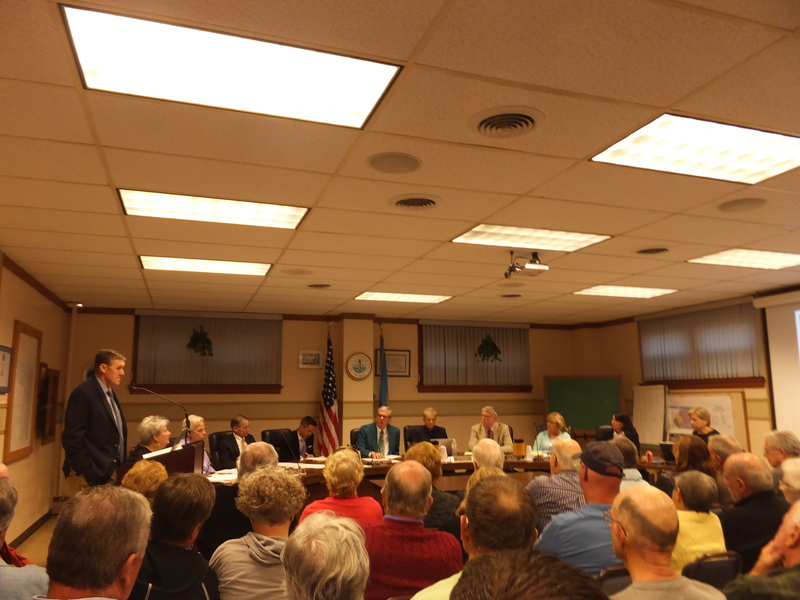Rehoboth Beach voters will head to the polls Saturday, June 27, to decide whether to authorize borrowing $70 million for the ocean outfall and City Hall projects.
Prior to setting a referendum vote, the city commissioners held a packed public hearing May 15 that allowed citizens to speak for or against the projects.
Engineer Jeff Sturdevant of GHD estimated the ocean outfall project cost at $52.5 million, which includes $8 million in upgrades to the wastewater treatment plant, $31 million for the force main and the outfall pipe and $12.5 million for a new biosolids treatment facility. The costs for the outfall pipe and the treatment upgrades include contingency, administrative and legal costs. Forty percent of the costs will be reimbursed by Sussex County for Rehoboth's treatment of wastewater from Henlopen Acres, North Shores and Dewey Beach.
Those numbers differed from numbers submitted by Mayor Sam Cooper at a presentation May 4: he estimated the outfall costs at $25 million, the plant upgrades at $15 million and $12.5 for the biosolids treatment facility.
The city has received a loan commitment from the state Water Infrastructure Advisory Council - $25 million for the outfall and $10 million for the treatment plant upgrades - at 2 percent interest each. Cooper said the city would apply for another loan for the biosolids treatment, hopefully at the 2 percent rate.
Sturdevant said construction could start in October 2017 and be operational by June 2018.
Sturdevant said construction will be limited to October to April to avoid the summer tourist season. Sturdevant said engineers are still looking at how much of the project can be done by open trench cut or by directional drill.
Sturdevant said the treatment plant upgrades will improve reliability and performance. Those upgrades include new equipment and filters, improving the preliminary treatment facility, fixing corroded piping and replacing the effluent filtration system, he said. The plant will also get a new pumping station, to be located in a retrofitted, unused storage tank, Sturdevant said.
The city will need to seek additional state funding to pay for the $12.5 million biosolids facility, which will upgrade the existing equipment to move from a liquid sludge to a dried sludge, reducing labor and disposal costs; the city currently injects its treated liquid sludge at a farm off Route 16 in Milton. Sturdevant said dried sludge is typically purchased by landscaping firms to use as fertilizer.
Most audience members chose to ask questions rather than declare their opinion of the project.
Jennifer Duncan of Rehoboth asked whether the water from the effluent was drinkable and whether there was any worry about human waste being discharged into the ocean. Cooper said the water going into the effluent going into the ocean had fewer nutrients than what comes out of the city's well water. Cooper and Sturdevant said the city's treatment is well within state limits on pollutants.
Dan McGuiness, 101 S. Boardwalk, said he was in favor of the treatment plant upgrades, but questioned the outfall. He said throwing away the treated water into the ocean would be a waste. Commissioner Stan Mills said studies have shown the city is not in a drought area.
Former mayoral candidate Tom McGlone asked whether the city had considered land application, questioned the rising costs of the project and asked what would happen if the referendum failed. Cooper said the cost increases were related to inflation, since the numbers were originally compiled in 2009. Cooper said there is no contingency plan, and the outfall is what the commissioners are pursuing.
Mabel Granke, 1013 Scarborough Ave. Extended, supported the outfall and said spray irrigation was not the right plan for Rehoboth because it would require 14 miles of piping, farm and woodlands and land would be difficult to find.
Frank Cooper, 96 East Lake Drive, said he at first supported land application but changed his opinion to support outfall because land application would still cause nutrients to go into the Inland Bays. He said ocean outfall was the best option, financially and environmentally.
The Washington, D.C. chapter of the Surfrider Foundation read a formal letter of opposition to the outfall. Their letter said the Delaware chapter has suggested a land-based alternative that is cheaper and easier to implement. The Surfriders said the decision to build an ocean outfall will affect where they decide to visit.
Mills said he did not mind debating the merits of the project with the Surfriders, but there was a great deal of misinformation within their statements. Mills read a comment that said resort towns like Rehoboth, Dewey Beach, Bethany Beach and Ocean City would lose business if tourists knew sewage was being pumped into the ocean.
"This person doesn't know that Bethany Beach and Ocean City have ocean outfall right now!" Mills said.
Environmentalist Mario Rocha said he did not support the idea of dilution as the solution to pollution and that the city was too hung up on the idea of costs. Rocha said ocean outfall was a huge risk, costwise.
Steve Myers, vice-chair of the Delaware Surfrider chapter, said Rehoboth officials should reevaluate the project and further study land application as an alternative. He said the city was rushing into a $52 million mistake that would likely cost more in the long run.
Tidewater Environmental Services sent a letter, read by City Solicitor Glenn Mandalas, saying it had a much more cost-effective option offering to pump the city's wastewater to a farm in Angola. The company requested postponing the referendum to allow it make its presentation to the city. Granke spoke up begging the commissioners not to allow Tidewater to get involved in the city's business. John Pappajohn, 2 Rehoboth Ave., asked the city commissioners to consider Tidewater's offer.
John and Susan Rohmer, 528 School Lane, and former Planning Commissioner Chairman Preston Littleton sent letters in support of the outfall project.
When asked by Rehoboth resident Ed O'Connor which option was better, land application or ocean outfall, Sturdevant said the answer was dependent on the area in which it is installed. He said one problem is land application cannot be done during rainstorms, necessitating storage for 2 million gallons of wastewater. That is particularly problematic in an area like Rehoboth, which can have a lot of rainy days.
Rehoboth City Hall project goes to referendum
A vote on the proposed $18 million City Hall project will also be held June 27.
Architect Mike Wigley said the current building, which dates back to the mid-1960s has minor structural deficiencies, lacks a fire suppression system and adequate handicapped accessibility and is at the end of its useful life. Wigley said the biggest problem is the building is not operationally adequate for the police department or city administration.
The plan calls from demolishing the existing City Hall and building a new, two-story building with an attic. The building will be oriented closer to Rehoboth Avenue than the current building.
All major city departments - police, administration, building and licensing, Alderman's Court and commissioners' room - will be under one roof. Rehoboth Beach Main Street and the parking department will be in a new building on the same site. The parking will be reoriented with public parking located at the east lot, behind the fire hall. Wigley said the former tech services building will be demolished to make room for additional parking.
Rehoboth Beach Convention Center will receive a new lobby, but the building will not undergo other changes. City officials have planned to close the convention center during construction.
Wigley said the building's exterior design was meant to evoke the brick façade and promenade area of the Rehoboth Beach Public Library. He said the plan would be to start work this fall and complete the project by winter 2016.
Cooper said the city plans to seek a loan from the U.S. Department of Agriculture to pay for the project. He said the project was important to improve working conditions for city employees.
"It's sorely needed," Cooper said.
Duncan said she took the tour of the building and called it embarrassing for the city.
"This is a no-brainer," she said.
Linda Kauffman, 206 Laurel St., asked about using the city-owned 306 Rehoboth Ave. building for the parking department. Cooper said the department functions well as a separate building and that the department also works better on the same campus as the rest of the city functions.
McGlone said the project was an excessive waste of money. He said it was inconsistent for the city to build a new, large building, while at the same time asking citizens to build smaller houses.
Cooper said the project would necessitate closing the convention center in November during construction. Mills said safety considerations were the main reason for closing, as the entire City Hall area would be a construction zone.
The city commissioners said they are confident they were ready to go to referendum on both projects. Mills said the city has done its homework and allowed the public to have their say in the process.
Cooper said while the referendum vote is on the same date, the projects are separate, allowing voters to vote yes on one and no on the other.
"This is a huge, huge step," he said.




















































